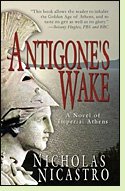Antigone's Wake
by Nicholas Nicastro
Reviewed by David Maclaine

Antigone's Wake offers a close-up look at an episode in the rise of Pericles' Athens, when the harsh demands of a growing empire came crashing into the personal life of one of city's most successful creative figures. It's a story spun from the historical tidbit that among the ten generals appointed by the Athenians to wage war on a rebellious ally was the playwright Sophocles, arguably the greatest dramatic writer both of the ancient world and the millennium after that world's collapse. The short novel focuses on the period immediately after the debut of Antigone, a play about a fatal conflict of duty, when an Athenian fleet sailed off with an army to punish the island of Samos. Antigone's Wake deals with Sophocles' decision to accept the position as general and with the consequences when he unexpectedly finds himself in a wartime command.
Nicastro shows us an intelligent man of the theater, worried about his lack of command experience, who is pleasantly surprised that the snap decisions he makes in times of crisis win him renown on the battlefield. But his personal war advances step-by-step toward tragedy. This novel's Sophocles is a philandering bisexual, leaning more toward women than men (quite different from the distinctly gay Sophocles in Warner's Pericles the Athenian) who is at once a devoted husband and a sometime bedmate of Pericles' famous companion Aspasia. Antigone's Wake is a skillfully-executed attempt to imagine how the harsh choices of war might have helped shape the great playwright's development. If you have read Sophocles' plays - and it is depressing to think that there are many who consider themselves educated who have not - Nicastro's novel offers a moving attempt to imagine the man behind them, an effort that, at the very least, serves as a reminder that it might be time to read the plays again. (2007, 211 pages)
More about Antigone's Wake at Powell's Books, Amazon.comAntigone's Wake appears on the list of The 36 Best Historical Novels for a Survey of Ancient Greek History
Other novels set in ancient Athens:
The Last of the Wine by Mary Renault (1956), about a student of Socrates. See review or more info at Powell's Books
The Flowers of Adonis by Rosemary Sutcliff (1969), about the brilliant but erratic Athenian general Alkibiades. More info
Glory and the Lightning by Taylor Caldwell (1974), about the courtesan Aspasia and Pericles of Athens. More info
Antigone and nonfiction about Sophocles:
Antigone by Sophocles (5th century B.C.), Sophocles' play about the legendary Antigone, forced to choose between her religious duty to bury her dead brother and her civic duty to obey her sovereign. More info
Sophocles and the Greek Tragic Tradition by Simon Goldhill (2009). More info
Sophocles and the Tragedy of Athenian Democracy by Josh Beer (2004). More info
At the Movies:
Antigone
Antigone
Online:
Sophocles at Wikipedia
Back to Novels of Ancient History
Back to Directory of Book Reviews